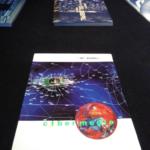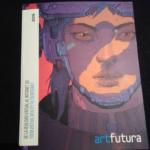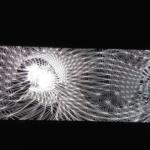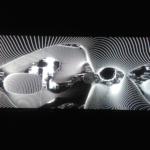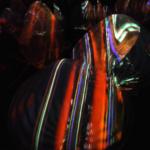 Nuove geometrie e composizioni prendono forma all’Ex Dogana per raccontare come l’arte assume sembianze diverse con l’uso delle nuove tecnologie. È il futuro che si presenta nella capitale vestito in arte digitale e si dà in mostra allo scalo San Lorenzo. Ed un futuro che arriva da lontano quello proposto per ArtFutura Roma, e ci proietta nella prossima, contemporanea e attuale esperienza dell’era digitale, come visionaria e virtuale interpretazione artistica.
Nuove geometrie e composizioni prendono forma all’Ex Dogana per raccontare come l’arte assume sembianze diverse con l’uso delle nuove tecnologie. È il futuro che si presenta nella capitale vestito in arte digitale e si dà in mostra allo scalo San Lorenzo. Ed un futuro che arriva da lontano quello proposto per ArtFutura Roma, e ci proietta nella prossima, contemporanea e attuale esperienza dell’era digitale, come visionaria e virtuale interpretazione artistica.
Mentre ti aggiri negli ampi spazi dell’area industriale, in quelle stanze dove una volta venivano smistate le merci, ti accolgono oggetti dalle forme insolite e immagini caleidoscopiche, pronte a proiettarti in scene che rimandano alle atmosfere di Lang in “Metropolis”, il film, con i suoi effetti speciali dei primi del ‘900 e alcune delle illusioni ottiche e degli effetti dimensionali cari a Schüfftan. Ma dopo pochi secondi le visioni ti riconsegnano alla contemporaneità di esperimenti più complessi, al mondo dell’arte che si lega al video e al digitale in nuove versioni grafiche e animazioni. Design, illustrazioni mobili e figure che possono trasformarsi in breve, sono la guida silenziosa in un’ambiente fuori dal tempo che racchiude i 26 anni di ArtFutura, il festival della Cultura e della Creatività Digitale, l’esposizione internazionale che per la prima volta porta la versione del futuro di alcuni dei principali artisti internazionali, e tutta la sua storia, a Roma.
La mostra prende le mosse da ArtFutura il festival di cultura digitale e creatività , nato nel 1990, e che con cadenza annuale si celebra a Barcellona, Buenos Aires, Ibiza, Londra, Montevideo e in diverse altre città del mondo per presentare idee e progetti di alcuni dei pionieri del movimento della Cyberculture dagli anni ’90, tra cui Rebecca Allen, William Gibson e Montxo Algora (che hanno dato e continuano a dare la direzione al festival).
Molti gli artisti e le produzioni coinvolte in questa itinerante exhibition-performance che di anno in anno si è arricchita di riflessioni sui progressi dell’arte digitale e sull’implicazione sociale delle nuove tecnologie: animazione informatica, videogiochi e effetti speciali rivisitati da artisti e pensatori provenienti da diverse discipline.
Tra gli ospiti che hanno partecipato alle diverse edizioni del festival, con incontri e conferenze ci sono stati anche Theo Jansen, Bruce Sterling, Laurie Anderson, Yoichiro Kawaguchi, Moebius, Derrick de Kerckhove, David Byrne, Howard Rheingold, Eduardo Kac, Kevin Kelly, Sherry Turkle, Toshio Iwai e Chris Cunningham.
 Così, mentre le città puntano su modelli di smart city e negli ultimi anni l’AI e il supporto delle nuove tecnologie offrono nuovi orizzonti di sviluppo sociale e economico, il mondo dell’arte già da tempo dialoga con nuove interfacce per sviluppare nuovi mondi ed esperienze sensoriali più coinvolgenti. L’appuntamento con il futuro all’Ex Dogana, fino al 10 settembre 2017, propone una connessione tra arte e scienza, in quest’edizione espositiva romana di ArtFutura con 7 installazioni visibili in 7 hangar e realizzate da 7 visual designer ed artisti digitali internazionali: Esteban Diácono – che ha curato il video di Ólafur Arnalds, Chico MacMurtrie, Paul Friedlander, Sachiko Kodama, Universal Everything, Can Buyukberber.
Così, mentre le città puntano su modelli di smart city e negli ultimi anni l’AI e il supporto delle nuove tecnologie offrono nuovi orizzonti di sviluppo sociale e economico, il mondo dell’arte già da tempo dialoga con nuove interfacce per sviluppare nuovi mondi ed esperienze sensoriali più coinvolgenti. L’appuntamento con il futuro all’Ex Dogana, fino al 10 settembre 2017, propone una connessione tra arte e scienza, in quest’edizione espositiva romana di ArtFutura con 7 installazioni visibili in 7 hangar e realizzate da 7 visual designer ed artisti digitali internazionali: Esteban Diácono – che ha curato il video di Ólafur Arnalds, Chico MacMurtrie, Paul Friedlander, Sachiko Kodama, Universal Everything, Can Buyukberber.

Can Buyukberber artista turco impiantato a San Francisco si occupa di esperienze audiovisive immersive in spazi fisici e digitali. Sono tre le opere presenti ad ArtFutura Roma: Morphogenesis, Celestial Collisions e Generative Tissues per mostrare la sua sperimentazione artistica sulla percezione e sulle sue varianti nell’arte digitale con l’utilizzo della tecnologia declinata tra mapping, realtà virtuale, costruzione di cupole geodetiche e software digitali.
Morphogenesis è un’installazione audiovisiva su uno schermo di 18 metri quadri. Una continua trasformazione che converte lo spazio virtuale in una successione temporale che assume le forme di una vera e propria narrazione. La composizione e scomposizione degli elementi dà forma a irreali paesaggi, fa emergere nuove forme geometriche e relazioni tra gli elementi per realizzare immagini psichedeliche che richiamano scenari familiari e nuove dimensioni futuriste. È un gioco di spazi geometrici tridimensionali in una contaminazione di immagini: atomi visuali e microelementi geometrici creano l’illusione di spazi infiniti dinamici, in un’incessante evoluzione, regalando suggestioni che a tratti sembrano rincorrere modelli della storia dell’arte da Max Ernest a Escher, reinterpretando in forma virtuale “figure” che sembrano provenire dalle illustrazioni di William Blake realizzate per il “Paradiso perduto” di Milton.
Proseguendo nelle stanze con le sculture cinetiche del fisico e matematico inglese Paul Friedlander – Kinetic light sculptor di “Spinning Cosmos” si incontrano forme oleografiche dinamiche che galleggiano nello spazio grazie a specchi ed elementi kinectic dalle infinite prospettive e l’utilizzo della “chromastrobic light”, la luce che cambia velocemente colore grazie ad un’applicazione di sua invenzione, per questa nuova forma di arte digitale.
La commistione di video e grafica, realtà virtuale, arte digitale, sperimentazioni cinetiche e una carrellata dei cataloghi del festival riempiono questa mostra curata da Montxo Algora, direttore dell’omonimo festival internazionale “ArtFutura”, prodotta da MondoMostre Skira con il patrocinio di Roma Capitale e dell’Università degli studi di Roma “La Sapienza” svolta dal 29 aprile al 10 settembre 2017, all’Ex Dogana di Roma.

Parole, lingua e linguaggio, arte e le nuove tecnologie sono quel filo rosso con il quale mi diverto a tessere le mie giornate. Innovazione e sviluppo di nuovi orizzonti gli spunti che mi fa piacere incontrare. Giornalista, editor, copy writer e content media. Dopo la laurea in Filosofia del Linguaggio e della Mente a Napoli, mi trasferisco a Roma dove mi specializzo in comunicazione per il web e i nuovi media e per diversi anni sono caporedattore del mensile “Next Exit, creatività e lavoro” approfondendo temi di economia della cultura. Ho curato la pubblicazione di diversi progetti editoriali, tra cui Young Blood, annuario dei giovani artisti italiani, e RomaCreativa, per fare una mappatura dei creativi italiani nel mondo e nella capitale.

